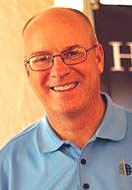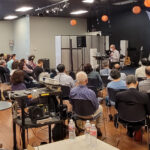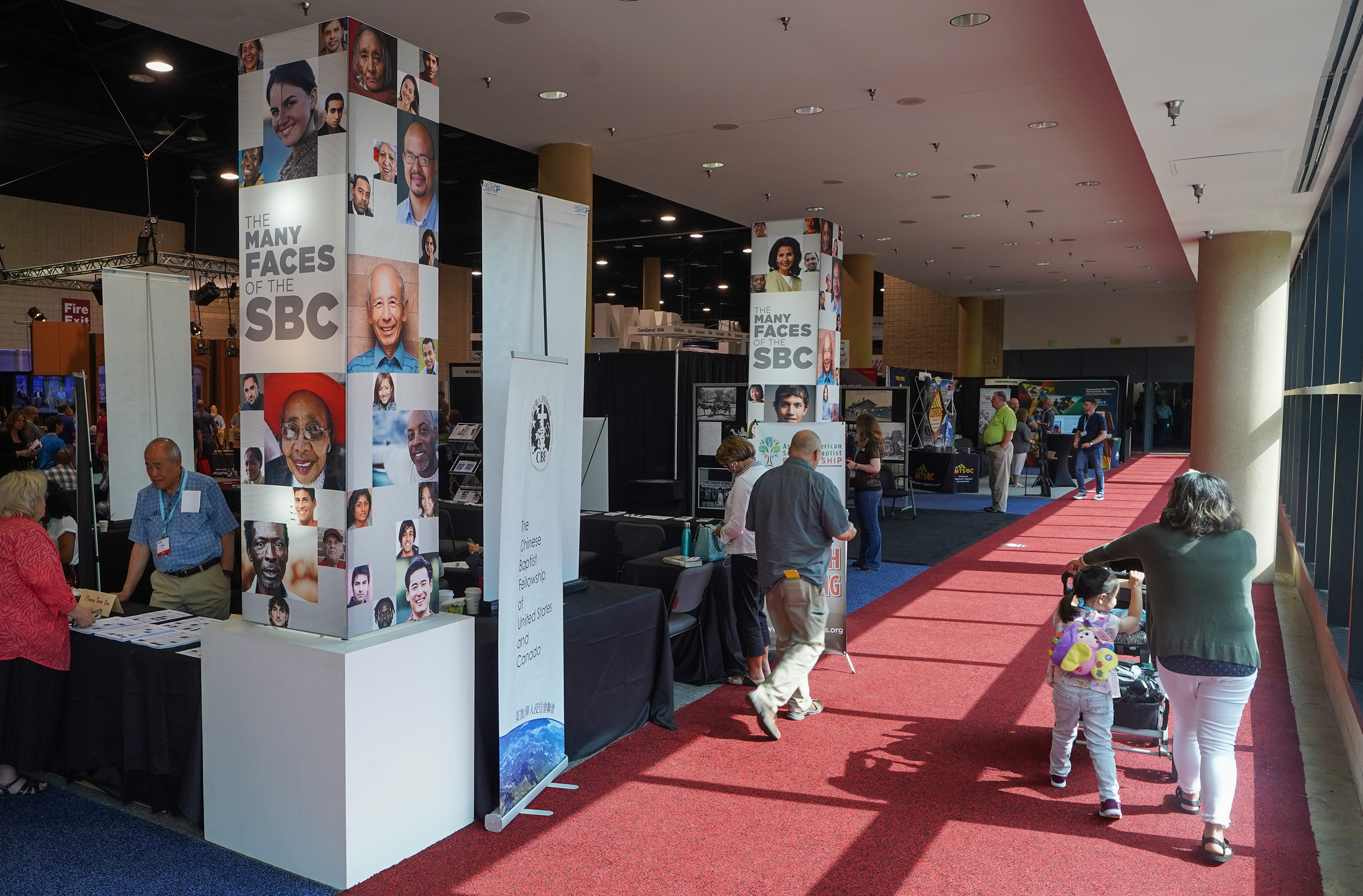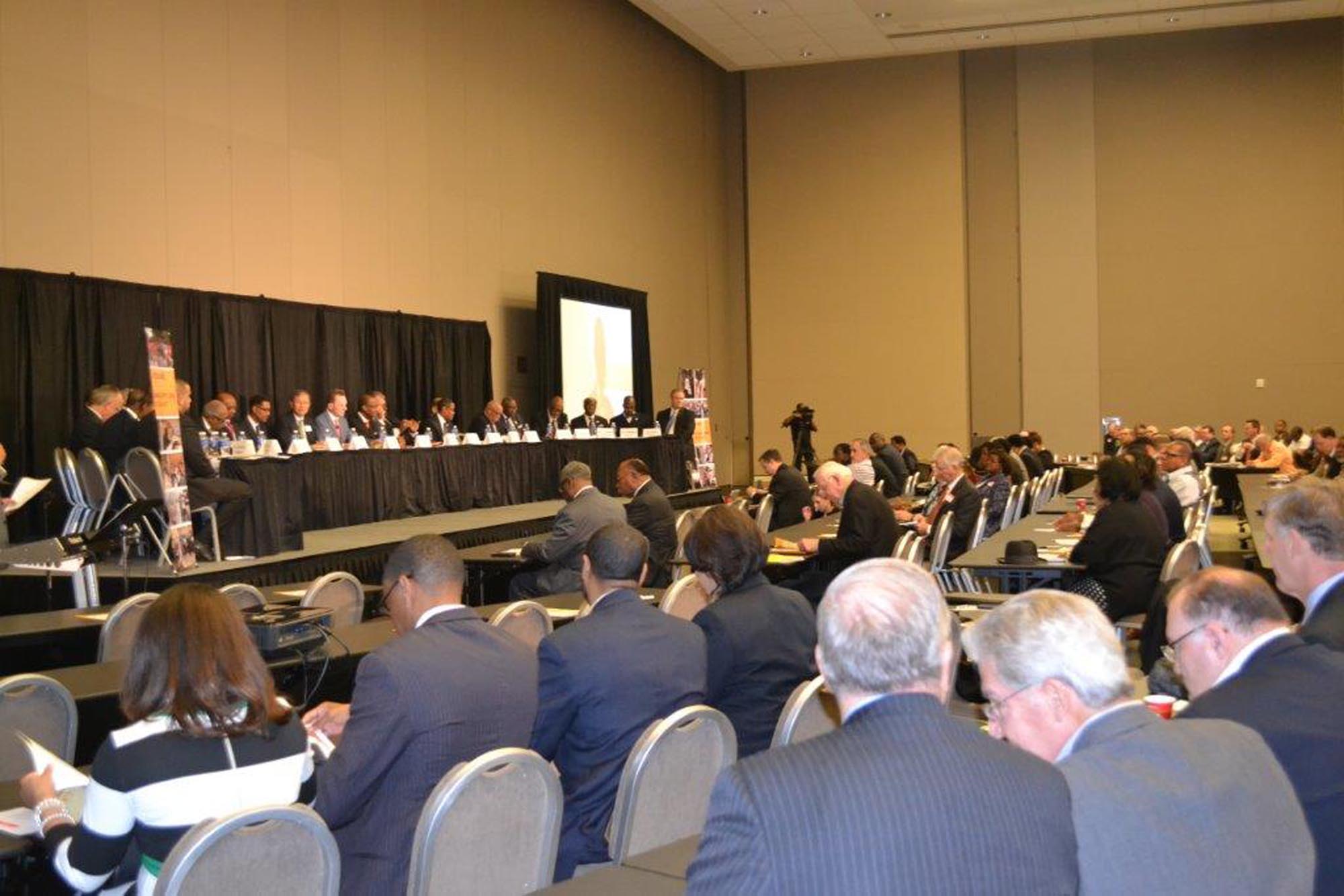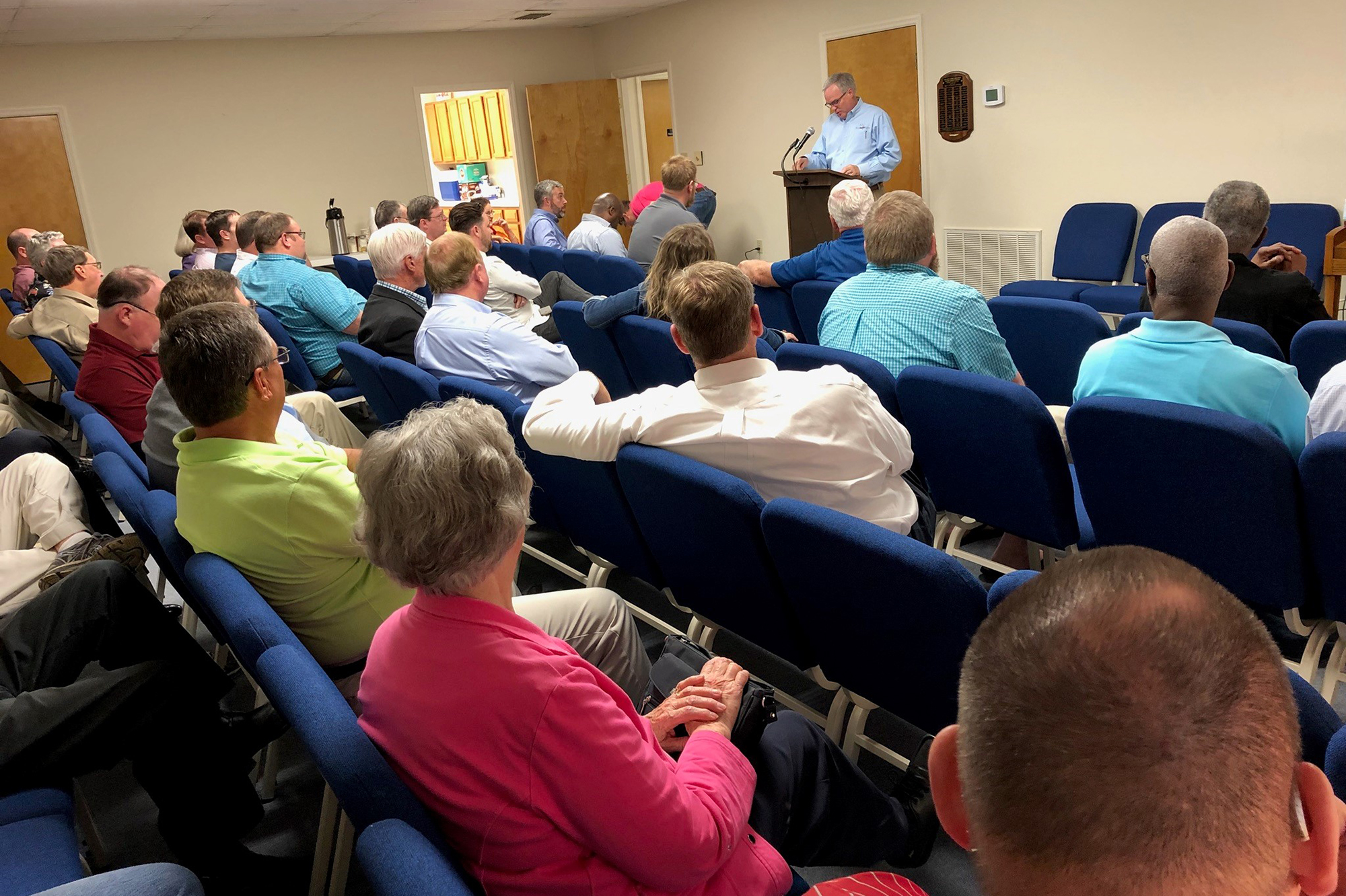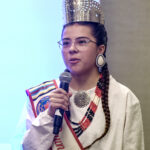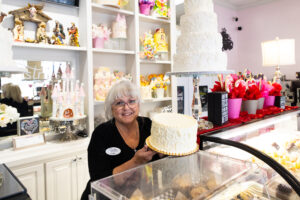
EDITOR’S NOTE: Atlanta pastor Gabriel C. Stovall, having read a much-publicized black minister’s decision to leave the Southern Baptist Convention, recounts the dialogue and changes of heart he has experienced in the SBC that stir him to remain in the convention.
ATLANTA (BP) — Almost 24 hours after the back-to-back deaths of Alton Sterling and then Philando Castile by the trigger hand of police officers last summer, my Facebook inbox lit up.
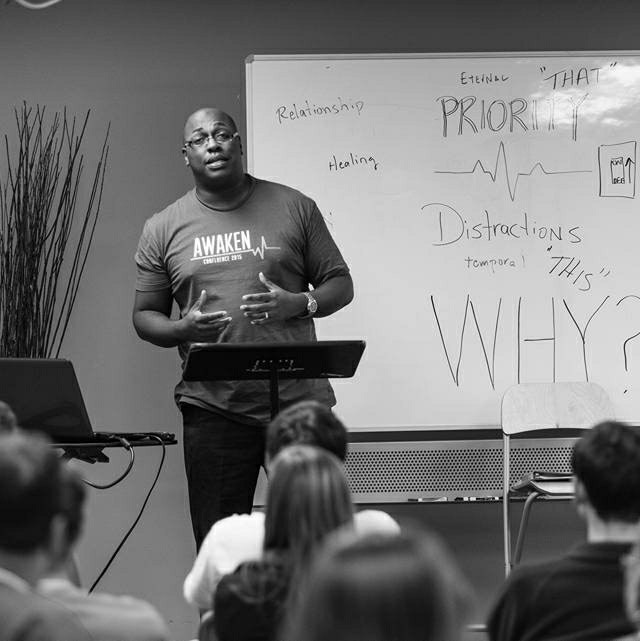 Nearly a dozen people, who I called brothers in Christ, were saying they had had enough.
Nearly a dozen people, who I called brothers in Christ, were saying they had had enough.
They were tired of watching black men get cut down by policemen’s bullets. They were nauseous, they said, of seeing white people scratch their collective heads trying to figure out why people of color were so traumatized by these deaths. And, equally so, they were confused why blacks weren’t seeing the side of the police in these matters — or at least giving those pledged to protect and serve the benefit of the doubt.
These inbox brothers were fed up. They were ready to take action. They didn’t care what it cost them.
These brothers were white Southern Baptists.
I met with one of these men, at his behest, at a Starbucks in downtown Atlanta, nestled closely between where both of us lead small congregations — mine, an historic, predominantly African American church in need of revitalization in a section of the city called the “Old Fourth Ward,” and his, an ethnically diverse church plant.
I spoke to him and he listened. He lamented to me and I listened. We both decided on an audacious goal: to find a way to pull out racism of all kinds by its roots, and to do it through the body of Christ.
We ended that conversation that day, equal parts heartbroken over the re-emerging racial tension in our nation and hopeful that even though we didn’t really know the answers to all of these matters, we knew of One who did.
We agreed to pray about next steps in starting a movement that didn’t seek to be “color blind,” but color-inclusive and color-embracing, at the foot of Christ’s cross. Several weeks later, my Facebook friend and I were joined by six other Southern Baptist pastors and leaders in the fellowship hall of my church, half black and half white.
There we ate together, discussed, vented, shouted, reasoned, agreed, disagreed, acknowledged our biases and what we perceived to be the biases of those whose skin and upbringing were not like ours.
It was uncomfortably productive to the point where we desired to do it again. And again. Our most recent meeting took place in the largest prison in Georgia after a tour we received from the prison’s director of chaplaincy — a black Southern Baptist who, several years earlier, became the first black associational missionary in Georgia and one of just a small handful of black directors of missions in Southern Baptist life.
We invited several others to the table, and when we told others of what we were doing, some expressed interest as well. Since our last meeting, while I’ve witnessed some extremely troubling mindsets and justifications over a myriad of issues, including racism, our current president, etc., I’ve also seen another side of the coin — a side that gives me hope.
It’s a side that causes me to daily dual with the inner dichotomy of empathizing with, and fighting for, continued civil progression of black people and people of color, while also reaching across the aisle to engage more people who believe like my Southern Baptist inbox friends.
What I’ve found is proof that old habits and mentalities die hard, whether you’re intentionally trying to eradicate them or not, and that the truth is often neither to the far left or right, but somewhere smack in the middle.
But I’ve also discovered that there are more than a few truly Christ-loving, white Southern Baptists who want to make full separation from the convention’s racist past and from what I call “political Christianity” — identifying your faith primarily through your political party, no matter what it is.
I’ve also found many who are humble enough to say, “Gabriel, I want to help pull down this nation’s racist stronghold, but I don’t know how. Can you help me?”
A black brother’s struggle
In mid-July I read an article published in The New York Times by a black brother in the Gospel named Lawrence Ware, titled, “Why I’m leaving the Southern Baptist Convention.”
As I read it, I recognized many of his feelings of frustration, angst and disgust, particularly at what I considered to be needless semantical gymnastics around that much-publicized resolution at the SBC annual meeting against the racist Alt-Right movement.
I identified with his struggle to walk away from the convention. I’ve been a part of Southern Baptist life for almost eight years now. I serve as a part-time state missionary in Georgia for church planting and as a part-time campus ministries pastor for one of the most ethnically diverse universities in the state. I planted a church as a Southern Baptist pastor and have recently led my new congregation to connect with the convention.
But I’ll admit that the way some white evangelicals caped for President Donald Trump — despite so many reasons to leave his candidacy in the dust, as they would’ve done for a Democratic candidate with some of the same issues hovering over his/her head — and the selective, loud silence some have given to issues important to me as a black believer, black Southern Baptist and black father raising a black son, I have spent much time in prayer asking God to show me if I’m truly in the right place.
I was drawn to the convention because of its emphasis on ministry and missions. The substance over style approach to ministry was, and still is. refreshing.
And even despite its still predominantly white makeup, I saw and worked with diversity that I’d never had the privilege of working with before.
Like the Egyptian couple I consulted who were planting a church in a primarily Arabic-speaking part of metro Atlanta. Or a Hispanic mission that wanted to partner with my church plant to help us reach Spanish-speaking people in our context.
Or even the white pastor who opened his doors for my church plant, free of charge, and invited me to the table with a Vietnamese and Hispanic congregation, along with his own ethnically mixed membership, to create a Vacation Bible School-style sports camp that reached a rainbow of ethnicities in a culturally diverse Atlanta suburb.
Every time I was tempted to make that call and say, “I’m done,” or to just walk away quietly, it was those images — and more — that crept into my spirit, speaking what I believe to be the words of God in answer to my inquisitive prayers, telling me, “You can’t go. I’ve got more work for you here.”
‘Stay where you are’
This past Sunday I preached to my congregation a message out of Mark chapter 5 titled, “Tell Your Testimony.” In it, I told the story of a demon-possessed man whom everyone in town had left for dead because of the severity of his demonic condition.
As I walked through the discussion of the text, I noted several points the text showed me about testimonies, about telling people what Christ has done for us and can do for others.
The first thing I told them was that testimonies can get you in trouble, as evidenced by how the people in the area of the Gadarenes sought to run Jesus out of town because of how He permitted the demons in the man to exit his body and jump into a herd of pigs, causing the pigs to run off a cliff and drown.
The people were upset at what Jesus did because the death of the pigs caused a dent in their income. In the end, they were more concerned about keeping their financial security and comfort zones intact than they were seeing an authentic move of God.
But that wasn’t the most powerful part of the text for me.
Next, I shared how sometimes testimonies can change your plans. And this is the part that, I believe, speaks directly to me regarding my place in Southern Baptist life.
After the man was healed and released from demon possession, he had a new lease on life — a new and exciting testimony about how Jesus can heal anyone because of how He healed him! He wanted to go on the road with this itinerant Nazarene and be his hype man, corroborating every word Jesus spoke and every miracle He wrought with personal experience.
But Jesus’ words halted the man’s steps and changed his plans. Jesus said, in essence, “No, you can’t go with Me. I want you to stay where you are and tell your testimony, and be a reminder of what I want to do in this region for those who believe in Me.”
Keep in mind, this is the same region that was mad with what Christ did to heal this man. It’s the same region where people who knew this man’s past condition were already afraid of him and probably weren’t too receptive to hearing any more about the exploits of this pig-killing Jesus.
Yet Jesus said, “stay.” He said go to the places where it may be uncomfortable, where some will not like what you have to say and where some may try to ostracize you for saying it, and give your testimony that if I can change your heart, I can change anyone’s heart if they let Me.
So here’s my testimony.
Once upon a time, I knew nothing about the Southern Baptist Convention except that it was founded in 1845 by white men who didn’t want much to do with anyone who looked like me. That’s all I knew, and it was enough for me to stay away. In my mind, no good could come from being a part of such an organization.
But then, one by one and person by person, God brought people into my life who began to change my heart. I met spiritually ambidextrous black men in the convention who knew how to preserve their own culture even while engaging another.
I met white men who some would consider part of the “old guard,” who didn’t just see me as a black face to potentially meet a “See, we aren’t racist. We hired this guy” quota. They saw me as a truly anointed vessel for Christ, different in many ways from themselves, except the way that mattered most.
I met a room full of college students through my campus ministry who wanted to find out how to apply the truth of the true Christ — not Democratic Jesus or Republican Jesus — to our nation’s maladies, starting at our own campus.
I met millennial Southern Baptists of all ethnicities, who some would consider an emerging “new guard,” who don’t want to see business as usual. Some of each — the old guard and the new — have allowed me to preach in their churches, consult with their leaders, stay in their homes and eat their food.
Others, predominantly white congregations, have come to help our mostly black church with an aging building, with the only expected reciprocity being that we come to their city and help them reach their ever-diversifying community for Christ.
And there’s more, but I don’t have space to tell it all. I can say this, though: Every time I get the itch to walk away, I think of the hearts who have been changed by dialogue with others who are different and shown true, tangible love even while struggling to understand — starting with my own heart.
It’s nowhere near perfect. But then, what group of people — Christians or otherwise — is?
So while I fully understand Bro. Lawrence’s decision and the reasons behind it, I also understand why I sense the voice of Jesus telling me the same thing He told that formerly demon possessed man: Stay put and tell your testimony. Stay put and share with others what you’ve already seen me do in your heart and in the hearts of others as a signpost of what I shall do in the hearts of those who will allow Me.
Staying doesn’t mean 100 percent agreement. Staying is not the same as placating to that which may be wrong. Staying doesn’t mean indifference to the injustices that still plague people of color. Staying doesn’t mean siding with one of our two corrupt political parties. And staying doesn’t mean turning my back on who I am as a black man. Only a shortsighted person could think that.
For me, staying put can be boiled down to one concept: my trust in the fact that Jesus knows more than I do about the power of my testimony. You can’t always run from everything and everyone that you deem problematic — not if you are to follow Christ’s example. And that’s what it comes down to for me. Sometimes the best way to work for change is from within.
In the end, I love black people. But I also love white people. And Hispanic people and Asian people and people whose ethnicity I can’t quite pinpoint. I love the church, both local and universal, and yes, I’ve grown to love the Southern Baptist Convention. But I can’t rank any love that I have over my love for Christ and the work of promoting unity in His body.

